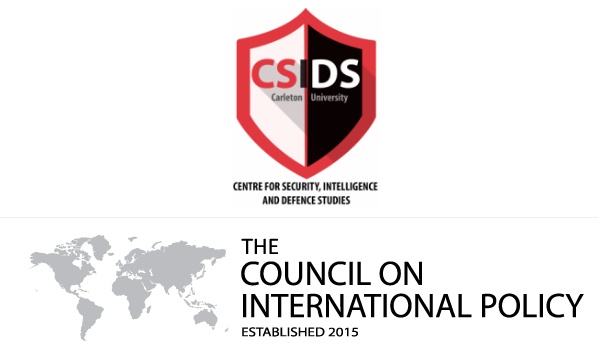The Indo-Pacific: Regional Approaches and Canada’s Role

“The Indo-Pacific: Regional Approaches and Canada’s Role”
Centre for Security, Intelligence and Defence Studies – Norman Paterson School of International Affairs, Carleton University in collaboration with The Council on International Policy
Where: Carleton University, 608 Robertson Hall (Senate Room), Ottawa, ON
When: March 11, 2019; 10:00 – 14:00 (registration opens at 9:30)
Admission: Free (RSVP BELOW)
Free Lunch and Refreshments Provided
Conference Agenda
9:30 Registration and Seating
10:00 Welcome Remarks
- Dr. Jeffrey Rice, Director of the Centre for Security, Intelligence, and Defence Studies
- Mr. Jonathan Berkshire Miller, Director of the Council on International Policy; Senior Fellow, Japan Institute of International Affairs
- Morning Remarks:
- His Excellency, Ambassador Kimihiro Ishikane, Ambassador of Japan to Canada
- Her Excellency Natasha Smith, Australia’s High Commissioner to Canada
10:30-12:30 Panel Discussion: Regional Perspectives on the Indo-Pacific
Highlighting some of the important areas of economic convergence (e.g. CPTPP, RCEP) and also looking at how different visions (e.g. US Indo-Pacific strategy, Japan’s Free and Open Indo-Pacific, China’s Belt and Road Initiative, etc.) in the region can promote cooperation and/or differ?What are the main tripwires in the region and how are states looking to cooperate to mitigate tensions? What is the role of mini-lateral and multilateral institutions and groupings? How are current US-China tensions likely to impact approach from other states.
- Japan: Dr. Tsutomu Kikuchi, Professor and Vice President, Aoyama Gakuin University
- US: Ms. Lindsey Ford, Director of Political and Security Affairs, Asia Society Policy Institute
- India: Mr. Dhruva Jaishankar, Fellow, Brookings India
- Canada: Mr. Jonathan Berkshire Miller, Senior Fellow, JIIA
- Moderator: Dr. Teddy Samy, NPSIA
12:45 -14:00 Luncheon Discussion: “Canada and the Indo-Pacific”
- Lunch speech: Mr. Mark Gwozdecky, Assistant Deputy Minister, International Security and Political Affairs, Global Affairs Canada
- Moderator: Mr. Jonathan Berkshire Miller, Director of the Council on International Policy, Senior Fellow – JIIA
- All guests are welcome to stay after the discussion for a luncheon. Lunch buffet and refreshments provided free of cost.
14:00 End of Symposium
CSIDS, in collaboration with the Council on International Policy, is pleased to invite you to take part in a public conference involving accomplished scholars, former policy makers, and other stakeholders from Canada, Japan, India the United States, and elsewhere who will reflect on and share insights on the growing importance on the Indo-Pacific region and looking at different visions and perspectives from regional actors.
The Indo-Pacific is facing a host of shared security challenges, from maritime piracy and crime, to heated territorial disputes and a pressing need to enhance regional capacity and readiness for humanitarian assistance and disaster relief to mitigate the impact of natural disasters. In the vast maritime space of the region – stretching from East Africa to the Pacific island chains – the foundations of regional commerce and security are secured through the freedom of navigation and secure sea lines of communication. Similarly, the maritime passage that connects the Indian and Pacific oceans is a highway for global commerce and trade, providing a critical link of connectivity for supply chains from East Africa and the Middle East all the way to the Far East. Indeed, the Indo-Pacific supply-chain is blanketed with key ports and rapidly growing infrastructure aimed at enhancing its connectivity.
There is great economic opportunity in the region with large economies and diverse fast-paced growth in many middle-size economies. That said, alongside this economic growth is a large demand for infrastructure development in the region – some estimate the need for more than $4 trillion in the coming years. To fill this void, several regional powers have the ability to work with states in the region for a sustainable way forward based on fair-lending, transparent institutions and long-term growth.
Yet, alongside these economic opportunities are a number of key challenges to the rules and order in the region that have underpinned security and prosperity for the littoral states. In the South China Sea, Beijing continues to practice salami-slicing tactics aimed at ensuring its de-facto control of much of the key water way through extensive land reclamation, the imposition of military equipment and the diplomatic splitting of states in the Association of Southeast Asian Nations (ASEAN). Meanwhile, Beijing also continues to raise regional concerns through its constant incursions into the maritime and airspace surrounding Japan’s Senkaku islands, also claimed by China and referred to as the Diaoyu, in the East China Sea. Taiwan also continues to hold a crucial role in the future of the region and lies as the strategic connection point between the Japanese Ryuku island chain and the South China Sea.
These concerns in the maritime realm are not limited to the East and South China Seas. In the Indian Ocean region, there has been a build-up of Chinese infrastructure development in critical areas such as deep ports in Sri Lanka and Pakistan. These moves have acutely informed the decision making of policymakers in India, who are wary of China’s long-term geopolitical motivations in Delhi’s periphery. Indeed, regional geopolitics is also shaping the strategic shifts in thinking as many states in the region – such as Japan, Australia India and the US – remain concerned about China’s growth and push outside its borders, evidenced by initiatives such as the Belt and Road Initiative and the Asian Infrastructure Investment Bank (AIIB).
This conference will look these critical areas and also at how Canada should look to play at a more principled role in the region through comprehensive engagement (on both political-security and economic issues) and work together with regional partners – including Japan, the US, Australia and India – to promote these shared interests.
This event is now sold out. Please contact the CSIDS Director at Jeffrey.rice@cunet.carleton.ca if you have questions.
Related posts:
Category: ANNOUNCEMENTS, EVENTS




